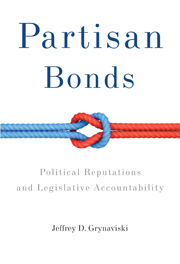7 - Conclusions
Published online by Cambridge University Press: 05 May 2010
Summary
Early democratic theorists were primarily concerned with the question of whether the people had the right and the competence to govern themselves. Little thought was given to the question of how public opinion would translate into successful government outcomes (cf. Schattschneider 1942). That changed in 1879 when Woodrow Wilson published “Cabinet Government in the United States,” an essay written in response to the widespread condemnation of universal suffrage among American intellectuals during the Industrial Revolution. Wilson contended that universal suffrage was being made the “scapegoat” for an unresponsive government, producing an incoherent set of policies regulating the nation's economic and foreign policies, when the real problem with the American political system was inferior institutions, especially inside Congress. In the decades that ensued, Wilson and others argued in favor of a system of responsible-party government, modeled after the British Westminster system, which allowed for accountable government in a representative democracy despite the fact that few voters meet idealized notions of the independent, informed democratic citizen.
Its proponents trumpet three main benefits from a system of responsible-party government. First, responsible-party government reduces the complex set of questions regarding how best to govern a complex society to a simple choice for voters between the policies of the incumbent ruling party in government and those advocated by the opposition. Nicely, by observing current conditions and the identity of the ruling party (and their memories of the past performance of the opposition party), voters have all the information they need to cast their ballots, despite the complexity of modern societies.
- Type
- Chapter
- Information
- Partisan BondsPolitical Reputations and Legislative Accountability, pp. 207 - 222Publisher: Cambridge University PressPrint publication year: 2010

